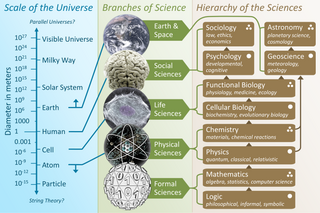
Engineering is the application of knowledge in the form of science, mathematics, and empirical evidence, to the innovation, design, construction, operation and maintenance of structures, machines, materials, devices, systems, processes, and organizations. The discipline of engineering encompasses a broad range of more specialized fields of engineering, each with a more specific emphasis on particular areas of applied mathematics, applied science, and types of application. See glossary of engineering.
Interdisciplinarity or interdisciplinary studies involves the combining of two or more academic disciplines into one activity. It draws knowledge from several other fields like sociology, anthropology, psychology, economics etc. It is about creating something by thinking across boundaries. It is related to an interdiscipline or an interdisciplinary field, which is an organizational unit that crosses traditional boundaries between academic disciplines or schools of thought, as new needs and professions emerge. Large engineering teams are usually interdisciplinary, as a power station or mobile phone or other project requires the melding of several specialties. However, the term "interdisciplinary" is sometimes confined to academic settings.

A polymath is a person whose expertise spans a significant number of subject areas, known to draw on complex bodies of knowledge to solve specific problems.
Social science is a category of academic disciplines, concerned with society and the relationships among individuals within a society. Social science as a whole has many branches. These social sciences include, but are not limited to: anthropology, archaeology, communication studies, economics, history, human geography, jurisprudence, linguistics, political science, psychology, public health, and sociology. The term is also sometimes used to refer specifically to the field of sociology, the original "science of society", established in the 19th century. For a more detailed list of sub-disciplines within the social sciences see: Outline of social science.
Software engineering is the application of engineering to the development of software in a systematic method.

Social epistemology refers to a broad set of approaches that can be taken in the study of knowledge that construes human knowledge as a collective achievement. Another way of characterizing social epistemology is as the evaluation of the social dimensions of knowledge or information. It is sometimes simplified to mean a social justification of belief.

A teacher is a person who helps others to acquire knowledge, competences or values.
Collegiality is the relationship between colleagues. Colleague is taken to mean a fellow member of the same profession, a group of colleagues united in a common purpose, and used in proper names, such as Electoral College, College of Cardinals, and College of Pontiffs.

Discipline and Punish: The Birth of the Prison is a 1975 book by the French philosopher Michel Foucault. It is an analysis of the social and theoretical mechanisms behind the changes that occurred in Western penal systems during the modern age based on historical documents from France. Foucault argues that prison did not become the principal form of punishment just because of the humanitarian concerns of reformists. He traces the cultural shifts that led to the predominance of prison via the body and power. Prison used by the "disciplines" – new technological powers that can also be found, according to Foucault, in places such as schools, hospitals, and military barracks.
In Western universities, a Bachelor of Divinity or Baccalaureate in Divinity is an undergraduate or postgraduate academic degree awarded for a course taken in the study of divinity or related disciplines, such as theology or, rarely, religious studies. In most modern universities, the BD as a first degree is essentially equivalent to a Bachelor of Arts degree with a speciality in divinity. Relatively few institutions award undergraduate Bachelor of Divinity degrees today, and the distinction between institutions that do award such degrees and those that award BA degrees for theological subjects is usually one of bureaucracy rather than curriculum.
Transdisciplinarity connotes a research strategy that crosses many disciplinary boundaries to create a holistic approach. It applies to research efforts focused on problems that cross the boundaries of two or more disciplines, such as research on effective information systems for biomedical research, and can refer to concepts or methods that were originally developed by one discipline, but are now used by several others, such as ethnography, a field research method originally developed in anthropology but now widely used by other disciplines.
The Belmont Forum elaborated that a transdisciplinary approach is enabling inputs and scoping across scientific and non-scientific stakeholder communities and facilitating a systemic way of addressing a challenge. This includes initiatives that support the capacity building required for the successful transdisciplinary formulation and implementation of research actions.
Postgraduate research represents a formal area of study that is recognized by a university or institute of higher learning. By definition, the notion of “postgraduate” carries the implication that the candidate undertaking such research has already completed a formal Master's degree and at some instances the PhD, at an accredited university or tertiary institution. The resulting qualifications arising from postgraduate research leads to Post (Doctorates).

Socratic questioning was named after Socrates, who was a philosopher in c. 470 BCE–c. 399 BCE. Socrates utilized an educational method that focused on discovering answers by asking questions from his students. Socrates believed that "the disciplined practice of thoughtful questioning enables the scholar/student to examine ideas and be able to determine the validity of those ideas". Plato, a student of Socrates, described this rigorous method of teaching to explain that the teacher assumes an ignorant mindset in order to compel the student to assume the highest level of knowledge. Thus, a student has the ability to acknowledge contradictions, recreate inaccurate or unfinished ideas and critically determine necessary thought.

The branches of science, also referred to as sciences, "scientific fields", or "scientific disciplines," are commonly divided into three major groups:

Web of Science is an online subscription-based scientific citation indexing service originally produced by the Institute for Scientific Information (ISI), later maintained by Clarivate Analytics, that provides a comprehensive citation search. It gives access to multiple databases that reference cross-disciplinary research, which allows for in-depth exploration of specialized sub-fields within an academic or scientific discipline.
An academic discipline or academic field, also known as a field of study and branch of knowledge, is a subdivision of knowledge that is taught and researched at the college or university level. Disciplines are defined, and recognized by the academic journals in which research is published, and the learned societies and academic departments or faculties to which their practitioners belong.
It includes scientific disciplines.
Jainism emphasises that ratnatraya — the right faith, right knowledge and right conduct — constitutes the path to liberation. These are known as the triple gems of Jainism and hence also known as Ratnatr

Information is the resolution of uncertainty; it is that which answers the question of "what an entity is" and is thus that which specifies the nature of that entity, as well as the essentiality of its properties. Information is associated with data and knowledge, as data is meaningful information and represents the values attributed to parameters, and knowledge signifies understanding of an abstract or concrete concept. The existence of information is uncoupled with an observer, which refers to that which accesses information to discern that which it specifies; information exists beyond an event horizon for example, and in the case of knowledge, the information itself requires a cognitive observer to be accessed.
Linguistics is the scientific study of language. It involves analysing language form, language meaning, and language in context. The earliest activities in the documentation and description of language have been attributed to the 6th-century-BC Indian grammarian Pāṇini who wrote a formal description of the Sanskrit language in his Aṣṭādhyāyī.

A scholar is a person who devotes themselves to scholarly pursuits, particularly to the study of an area in which they have developed expertise. A scholar may also be an academic, a person who works as a teacher or researcher at a university or other higher education institution. An academic usually holds an advanced degree.










